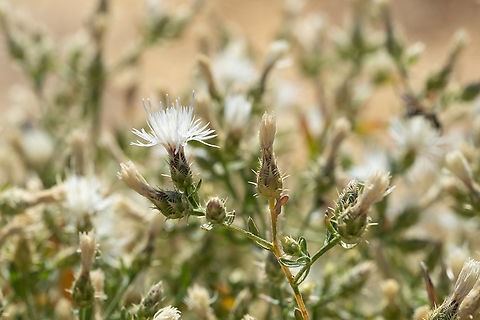
Appearance
Diffuse knapweed is an annual or biennial plant, generally growing to between 10 and 60 cm in height. It has a highly branched stem and a large taproot, as well as a basal rosette of leaves with smaller leaves alternating on the upright stems. Flowers are usually white or pink and grow out of urn-shaped heads carried at the tips of the many branches. Diffuse knapweed often assumes a short rosette form for one year, reaching maximum size, then rapidly growing and flowering during the second year. A single plant can produce approximately 18,000 seeds.Naming
Diffuse knapweed is considered an invasive species in some parts of North America, having established itself in many areas of the continent. "C. diffusa" was first identified in North America in 1907 when it was found in an alfalfa field in Washington state. The seeds had presumably been transported in an impure alfalfa seed shipment coming from somewhere in the species native range. Now present in at least 19 states in the United States, it has naturalized in all contiguous states west of the Rockies and additionally in Connecticut, Massachusetts, and New Jersey. Portions of western Canada have also been colonized by this plant.Areas in which diffuse knapweed has been established generally are plains rangelands or forest benchlands. Land that has recently been disturbed is commonly colonized. It grows in semi-arid and arid environments and seems to favor light, dry, porous soils. Areas with large amounts of shade or high levels of water discourage diffuse knapweed growth.
"diffusa" can be dispersed in multiple ways, such as contamination of food, wind dispersal, and water dispersal however wind is the primary dispersal method.
Distribution
It is native to Eastern Europe and Western Asia, specifically the nations of Turkey, Syria, Bulgaria, Greece, Romania, Ukraine, and southern Russia.References:
Some text fragments are auto parsed from Wikipedia.